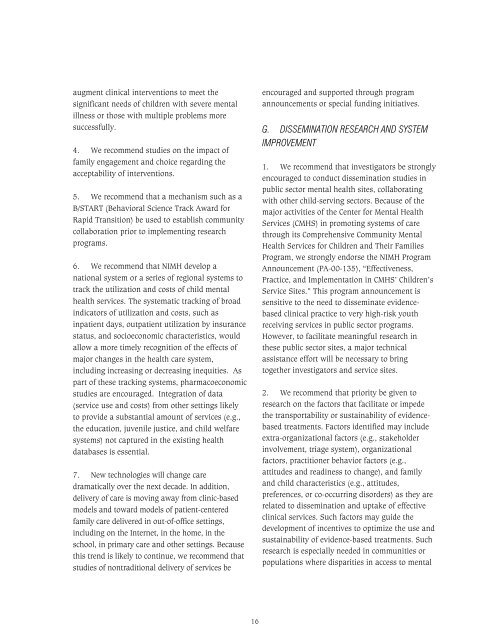Research on Child and Adolescent Mental Health
Research on Child and Adolescent Mental Health
Research on Child and Adolescent Mental Health
You also want an ePaper? Increase the reach of your titles
YUMPU automatically turns print PDFs into web optimized ePapers that Google loves.
augment clinical interventi<strong>on</strong>s to meet the<br />
significant needs of children with severe mental<br />
illness or those with multiple problems more<br />
successfully.<br />
4. We recommend studies <strong>on</strong> the impact of<br />
family engagement <strong>and</strong> choice regarding the<br />
acceptability of interventi<strong>on</strong>s.<br />
5. We recommend that a mechanism such as a<br />
B/START (Behavioral Science Track Award for<br />
Rapid Transiti<strong>on</strong>) be used to establish community<br />
collaborati<strong>on</strong> prior to implementing research<br />
programs.<br />
6. We recommend that NIMH develop a<br />
nati<strong>on</strong>al system or a series of regi<strong>on</strong>al systems to<br />
track the utilizati<strong>on</strong> <strong>and</strong> costs of child mental<br />
health services. The systematic tracking of broad<br />
indicators of utilizati<strong>on</strong> <strong>and</strong> costs, such as<br />
inpatient days, outpatient utilizati<strong>on</strong> by insurance<br />
status, <strong>and</strong> socioec<strong>on</strong>omic characteristics, would<br />
allow a more timely recogniti<strong>on</strong> of the effects of<br />
major changes in the health care system,<br />
including increasing or decreasing inequities. As<br />
part of these tracking systems, pharmacoec<strong>on</strong>omic<br />
studies are encouraged. Integrati<strong>on</strong> of data<br />
(service use <strong>and</strong> costs) from other settings likely<br />
to provide a substantial amount of services (e.g.,<br />
the educati<strong>on</strong>, juvenile justice, <strong>and</strong> child welfare<br />
systems) not captured in the existing health<br />
databases is essential.<br />
7. New technologies will change care<br />
dramatically over the next decade. In additi<strong>on</strong>,<br />
delivery of care is moving away from clinic-based<br />
models <strong>and</strong> toward models of patient-centered<br />
family care delivered in out-of-office settings,<br />
including <strong>on</strong> the Internet, in the home, in the<br />
school, in primary care <strong>and</strong> other settings. Because<br />
this trend is likely to c<strong>on</strong>tinue, we recommend that<br />
studies of n<strong>on</strong>traditi<strong>on</strong>al delivery of services be<br />
encouraged <strong>and</strong> supported through program<br />
announcements or special funding initiatives.<br />
G. DISSEMINATION RESEARCH AND SYSTEM<br />
IMPROVEMENT<br />
1. We recommend that investigators be str<strong>on</strong>gly<br />
encouraged to c<strong>on</strong>duct disseminati<strong>on</strong> studies in<br />
public sector mental health sites, collaborating<br />
with other child-serving sectors. Because of the<br />
major activities of the Center for <strong>Mental</strong> <strong>Health</strong><br />
Services (CMHS) in promoting systems of care<br />
through its Comprehensive Community <strong>Mental</strong><br />
<strong>Health</strong> Services for <strong>Child</strong>ren <strong>and</strong> Their Families<br />
Program, we str<strong>on</strong>gly endorse the NIMH Program<br />
Announcement (PA-00-135), “Effectiveness,<br />
Practice, <strong>and</strong> Implementati<strong>on</strong> in CMHS’ <strong>Child</strong>ren’s<br />
Service Sites.” This program announcement is<br />
sensitive to the need to disseminate evidencebased<br />
clinical practice to very high-risk youth<br />
receiving services in public sector programs.<br />
However, to facilitate meaningful research in<br />
these public sector sites, a major technical<br />
assistance effort will be necessary to bring<br />
together investigators <strong>and</strong> service sites.<br />
2. We recommend that priority be given to<br />
research <strong>on</strong> the factors that facilitate or impede<br />
the transportability or sustainability of evidencebased<br />
treatments. Factors identified may include<br />
extra-organizati<strong>on</strong>al factors (e.g., stakeholder<br />
involvement, triage system), organizati<strong>on</strong>al<br />
factors, practiti<strong>on</strong>er behavior factors (e.g.,<br />
attitudes <strong>and</strong> readiness to change), <strong>and</strong> family<br />
<strong>and</strong> child characteristics (e.g., attitudes,<br />
preferences, or co-occurring disorders) as they are<br />
related to disseminati<strong>on</strong> <strong>and</strong> uptake of effective<br />
clinical services. Such factors may guide the<br />
development of incentives to optimize the use <strong>and</strong><br />
sustainability of evidence-based treatments. Such<br />
research is especially needed in communities or<br />
populati<strong>on</strong>s where disparities in access to mental<br />
16

















